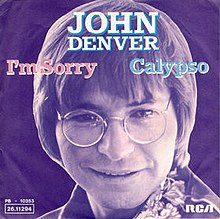
"Thank God I'm a Country Boy", also known as "Country Boy", is a song written by John Martin Sommers and recorded by American singer/songwriter John Denver. The song was originally included on Denver's 1974 album Back Home Again. A version recorded live on August 26, 1974, at the Universal Amphitheatre in Los Angeles was included on his 1975 album An Evening with John Denver. The live version was released as a single and went to No. 1 on both the Billboard magazine Hot Country Singles and Billboard Hot 100 charts. The song topped both charts for one week each, first the country chart, and the Hot 100 chart a week later. Thank God I'm a Country Boy also became the name of a variety special show hosted by Denver in 1977.

"I'm a Believer" is a song written by Neil Diamond and recorded by American band the Monkees in 1966 with the lead vocals by Micky Dolenz. The single, produced by Jeff Barry, hit the number-one spot on the U.S. Billboard Hot 100 chart for the week ending December 31, 1966, and remained there for seven weeks becoming the last number-one hit of 1966 and the biggest-selling single for all of 1967. Billboard ranked the record as the number-five song for 1967. While originally published by Screen Gems-Columbia Music (BMI), it is now published by Stonebridge Music/EMI Foray Music (SESAC), with administration passed to Sony Music Publishing and Universal Music Publishing Group.

"Pinball Wizard" is a song by the English rock band the Who, written by guitarist and primary songwriter Pete Townshend and featured on their 1969 rock opera album Tommy. The original recording was released as a single in 1969 and reached No. 4 in the UK charts and No. 19 on the U.S. Billboard Hot 100.
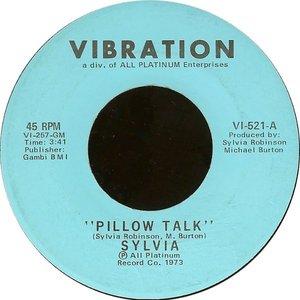
"Pillow Talk" is a 1973 song by American singer and songwriter Sylvia, written by Sylvia along with Michael Burton.

"Misty Blue" is a song written by Bob Montgomery that has been recorded and made commercially successful by several music artists. Although Montgomery wrote the song for a different artist in mind, it was brought first to the attention of Wilma Burgess in 1966. It was recorded by Eddy Arnold the following year, both versions were top 5 Country Hits. A decade later, blues artist Dorothy Moore released the highest-charting version of the song and it reached the top ten in several different radio formats. Following Moore's revival of the track, numerous artists re-covered the tune, including country artist Billie Jo Spears. Spears's version would also go on to become a successful single release. Numerous other artists and musicians of different genres have recorded their own versions of "Misty Blue". The song is now considered both a country music and blues standard.
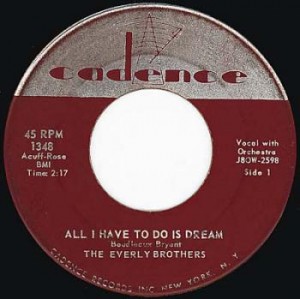
"All I Have to Do Is Dream" is a song made famous by the Everly Brothers, written by Boudleaux Bryant of the husband-and-wife songwriting team Felice and Boudleaux Bryant, and published in 1958. The song is ranked No. 141 on the Rolling Stone magazine's list of The 500 Greatest Songs of All Time. The song is in AABA form.
"Emma" is a 1974 song by the British soul band Hot Chocolate. Written by band members Errol Brown (vocals) and Tony Wilson (music), the song address themes of suicide, early death and lost childhood. Brown's lyrics celebrate his recently deceased mother. Their rawness was developed after the producer Mickie Most asked him for further "depth and darkness".

"Sunshine on My Shoulders" is a song recorded and co-written by American singer-songwriter John Denver. It was originally released as an album track on 1971's Poems, Prayers & Promises and later, as a single in 1973. It went to No. 1 on the Billboard Hot 100 chart in the U.S. in early 1974.

"These Dreams" is a song by American rock band Heart from their |1985 self-titled eighth studio album. It was released on January 18, 1986, as the album's third single, becoming the band's first song to top the Billboard Hot 100. The single's B-side track "Shell Shock", was also the B-side of Heart's previous single "Never".

"Break It to Me Gently" is a pop song written by blues musician Joe Seneca with lyrics by Diane Lampert. Both Brenda Lee and Juice Newton were met with considerable success with their versions of the song.
"I'm Sorry" is a 1960 hit song by 15-year-old American singer Brenda Lee. The song was written by Dub Allbritten and Ronnie Self. It peaked at No. 1 on the Billboard Hot 100 singles chart in July 1960. On the UK Singles Chart, the song peaked at No.12. AllMusic guide wrote that it is the pop star's "definitive song", and one of the "finest teen pop songs of its era". In 1999, the 1960 recording by Lee on Decca Records was inducted into the Grammy Hall of Fame.

"Back Home Again" is a popular song written and performed by the American singer-songwriter John Denver. "Back Home Again" was released as a single from his album of the same name in 1974.
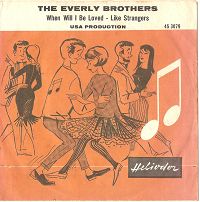
"When Will I Be Loved" is a popular song written by Phil Everly of the Everly Brothers, who had a US top-ten hit with it in 1960. Linda Ronstadt covered the song in 1975, and her version was an even bigger hit in the US, peaking at No. 2. Vince Gill also covered it in 1994 on the soundtrack of the film 8 Seconds.
"My Boy" is a popular song from the early 1970s. The music was composed by Jean-Pierre Bourtayre and Claude François, and the lyrics were translated from the original version "Parce que je t'aime, mon enfant" into English by Phil Coulter and Bill Martin.

"Come Go with Me" is a song by American girl group Exposé from their debut studio album Exposure (1987). Composed and produced by Lewis A. Martineé, the song was released in January 1987 as the third single from Exposure. The group’s second lineup recorded "Come Go with Me", with Jeanette Jurado singing lead vocals, and Gioia Bruno and Ann Curless singing backup. Some vocals from the original lineup of Exposé remain in the released track.

"And the Beat Goes On" is a 1979 single by the American music group The Whispers. The song was their first of two number-one singles on the Soul chart, and their first Top 20 hit on the Billboard Hot 100, peaking at number 19. "And the Beat Goes On" was the group's only number-one song on the dance chart. It was also their first and biggest hit in the United Kingdom, peaking at number 2 on the UK Singles Chart. The song also peaked at number 27 on the Canadian RPM chart.
"Funny How Time Slips Away" is a song written by Willie Nelson and first recorded by country singer Billy Walker. Walker's version was issued as a single by Columbia Records in June 1961 and peaked at number 23 on the Hot C&W Sides chart. The song has been featured in several live action films and television shows, such as in the first episode of the second season of AMC’s Better Call Saul and in the 2020 Netflix drama The Devil All the Time.
"The Tip of My Fingers", also titled "The Tips of My Fingers", is a song written and originally recorded by American country music singer Bill Anderson. First included on his 1962 album Bill Anderson Sings Country Heart Songs, the song was a Top Ten country single for him in 1960.
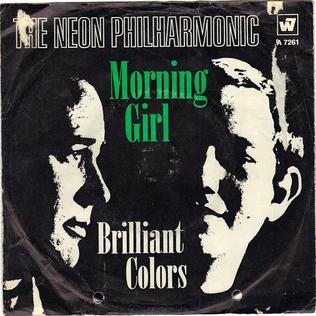
"Morning Girl" is a 1969 song by The Neon Philharmonic. It was a hit in Canada and the United States. The recording featured a chamber-sized orchestra of Nashville Symphony Orchestra musicians, and the project was headed by composer Tupper Saussy and vocalist Don Gant.

"My Uncle Used to Love Me But She Died" is a 1966 song by Roger Miller. It was the fourth of four singles released from Miller's fourth LP, Words and Music, all of which became U.S. Top 40 Country hits.
